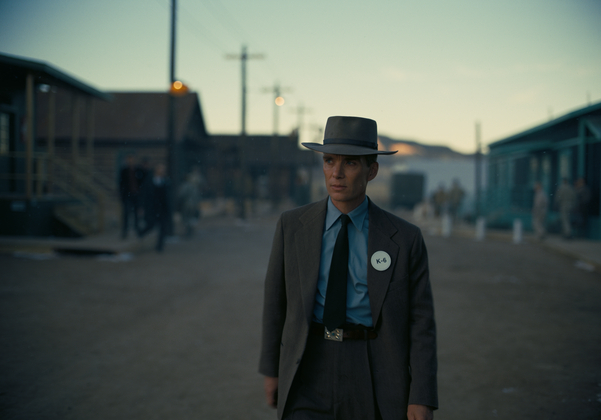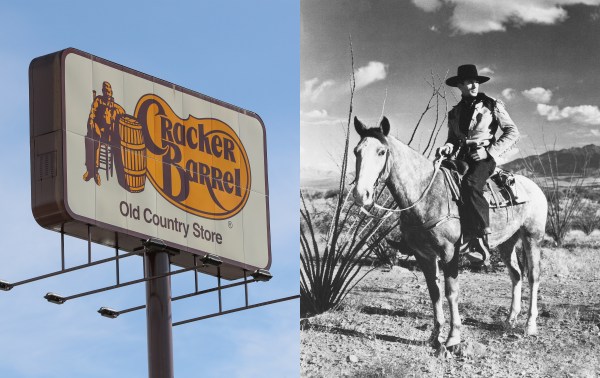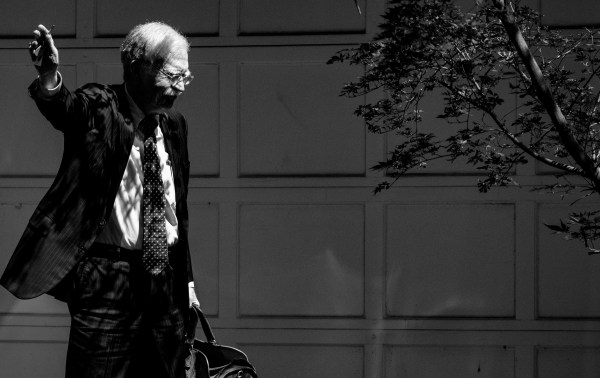One of the most impressive things Christopher Nolan manages to do in Oppenheimer is striking a balance between admiration and ambivalence for “the father of the atomic bomb.” It’s a dual attitude his film shares with a far older story about a similarly titanic figure.
Oppenheimer begins with a title-card synopsis of the Ancient Greek myth of Prometheus, which reads:
Prometheus stole fire from the gods and gave it to man.
For this he was chained to a rock and tortured for eternity.
Eighteenth and 19th-century intellectuals had a fondness for the god-defier. Goethe and Shelley adapted the myth into poems and plays. Marx and Nietzsche alluded to it in their political works. And all four regarded Prometheus as a symbol of free-thinking résistance. That’s the interpretation that Kai Bird and Martin J. Sherwin echoed a few centuries later in American Prometheus, the Pulitzer-prize winning biography of J. Robert Oppenheimer and the basis for Nolan’s film. They write in the book’s preface:
Like the rebellious Greek god Prometheus—who stole fire from Zeus and bestowed it upon humankind, Oppenheimer gave us atomic fire. But then, when he tried to control it, when he sought to make us aware of its terrible dangers, the powers-that-be, like Zeus, rose up in anger to punish him.
It’s a common, decisively modern interpretation of the myth. It’s also incomplete.
Arguably the myth’s most famous surviving adaptation, Prometheus Bound by the ancient playwright Aeschylus, shows Prometheus as a prototypical tragic figure.
He earns praise by saving humanity from a Zeus-induced apocalypse, but he also introduces seeds of humanity’s psychological and spiritual undoing. Prometheus, Aeschylus writes, “caused mortals to cease foreseeing death.” His gift of fire “enables all the arts,” engendering astronomy, mathematics, and agriculture alike, but it also sets “mortals on the road to the murky craft of divination.” Divination frees Prometheus—who possesses a prophecy of Zeus’ downfall, undoubtedly valuable mythical intel—but with dire consequences for humans. Especially one: Io, the daughter of the king of Argos, who is exiled by her father on an oracle’s orders and is soon after bewitched by Zeus’ jealous wife, Hera.
Who started the chain reaction that gave humanity oracles in the first place? Whose advancements enabled them to ignore even their mortality? Yes, Prometheus lit the flame that sparked civilization, but Aeschylus suggests that he not only caused suffering, but facilitated a disregard for the proper place of humanity in the Greek cosmos.
Nolan’s film also depicts a conflict of a cosmic scale. The opening scenes show Oppenheimer (deftly portrayed by Cillian Murphy) and his harrowed fascination with quantum physics: ripples in a puddle trigger thoughts of collapsing stars and expanding galaxies. Nolan palpably admires the scientist’s ability to turn theory into arguably the most consequential, and deadly, scientific development in history. But like Aeschylus, Nolan is keenly aware of his protagonist’s flaws.
Notice the difference between Bird and Sherwin’s preface and Nolan’s opening title card. The former immediately identifies Zeus, calling out authoritative “powers-that-be.” Nolan doesn’t—there’s no direct mention of Zeus or of Prometheus’ rebelliousness. And who exactly “chains” Oppenheimer, the film’s Promethean stand-in? (Reader beware: spoilers ahead.)
The straightforward possibility is Lewis Strauss (Robert Downey Jr.), the chair of the Atomic Energy Commission who, largely out of jealousy, staged a closed-door hearing (read: kangaroo court) that denied Oppenheimer’s security clearance from being renewed. But Nolan doesn’t merely blame Strauss—he also recognizes Oppenheimer’s lapsed judgment.
Oppenheimer undermines protocols and takes unnecessary risks throughout the Manhattan Project, especially through a romantic affair with Jean Tatlock and close friendship with Haakon Chevalier, both known and adamant communists, the latter of whom had ties with the Soviet Union. Unsurprisingly, Strauss uses this information against Oppenheimer. Zeus may have chained Prometheus, but Prometheus’ own hubris also contributed to his predicament: Oppenheimer, it seems therefore, partly “chained” himself. Nolan’s decision to condemn both Strauss’ vindictiveness and Oppenheimer’s naivete shows he’s not interested in a mere “anti-McCarthyite narrative.”
Nor is Nolan interested in “a History Channel movie with fancy editing,” as the headline of Richard Brody’s New Yorker review of the film claims. The movie’s nonlinear structure—one of Brody’s main gripes—is certainly an acquired taste, but it doesn’t simplify Oppenheimer’s story or flatten the moral dilemmas he faced while developing the atomic bomb. On the contrary, the time jumps buttress Nolan’s ambivalent conclusions about Oppenheimer.
Take a critical scene shown at different points in the film. A few years after the war, Oppenheimer and Strauss meet with the Atomic Energy Commission to discuss reports of a detonated Soviet atom bomb. The Soviets, Strauss fears, could only have gathered the intel to build the bomb from Los Alamos—the New Mexico site where the original bomb was developed, supposedly with secrecy in mind. Strauss stresses, as he does throughout much of the film, the need to one-up the Soviets by developing a stronger hydrogen bomb. Oppenheimer, now increasingly worried about nuclear proliferation, pushes back.
But they must have been thinking about other things too. Strauss is worried about geopolitics and his reputation with President Truman, but he also recalls an earlier conversation where Oppenheimer characterized Strauss’ father as “a lowly shoe salesman,” or the time the scientist embarrassed him at a congressional hearing on the exportation of radioisotopes. Oppenheimer is likewise worried about the world’s safety in an atomic age—he imagines ripples around cities on a map, similar to those on the puddle at the beginning of the film. But he surely wonders whether investigating a potential leak at Los Alamos may also uncover his own questionable behavior with Tatlock and Chevalier. Neither of their motives are pure, nor entirely unjustified.
All this is easy to miss amid the film’s rapid-fire dialogue, caught up in its operatic scale. There are few overt mic-drop lines: just the intricacies of realizing, once the whole thing is over, what could have—must have—been going through the minds of characters at pivotal moments. Nolan’s films are like that, coming more fully to life with repeated viewings.
These elements add up to the film’s main realization, a disquieting ambivalence captured by Cillian Murphy’s tortured facial expression in the final scene, which remains chilling long after the credits roll. Nolan undoubtedly admires Oppenheimer’s intelligence and the wherewithal it took to develop the atom bomb. But his admiration is restrained not only by necessary questions about when force is appropriate in war, but also by another eerie thought: that part of Oppenheimer’s punishment—arguably the most painful part—was recognizing we humans might not be able to handle the fire he gave us.
Oppenheimer is complex and rewarding, and it merits a second or third viewing to see just how much its American Prometheus resembles not the rebellious icon romantics and radicals imagined, but the ambivalent, tragic figure of antiquity. Aeschylus would approve.







Please note that we at The Dispatch hold ourselves, our work, and our commenters to a higher standard than other places on the internet. We welcome comments that foster genuine debate or discussion—including comments critical of us or our work—but responses that include ad hominem attacks on fellow Dispatch members or are intended to stoke fear and anger may be moderated.
With your membership, you only have the ability to comment on The Morning Dispatch articles. Consider upgrading to join the conversation everywhere.